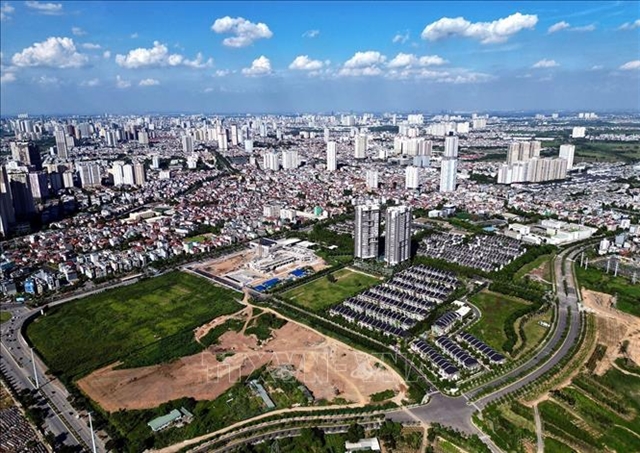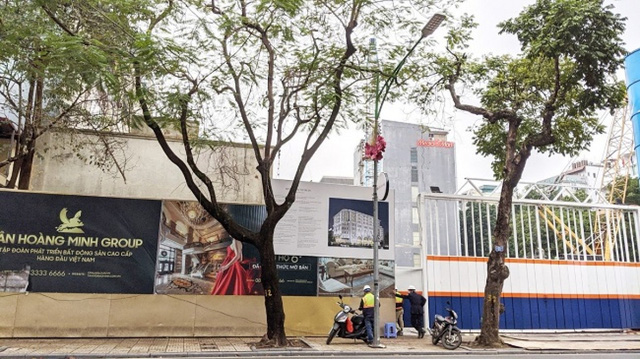 Economy
Economy

Despite the pandemic impacting the resort, hotel and rental market, the housing and apartment segment still has projects for sale at record prices.

|
| The Grand Hàng Bài project (at 22-24 Hàng Bài, Hai Bà Trưng District) has an offering price of VNĐ570-700 million per square metre. — Photo vov.vn |
HÀ NỘI — Despite the pandemic impacting the resort, hotel and rental market, the housing and apartment segment still has projects for sale at record prices.
The real estate market report in the second quarter of 2021 from the Ministry of Construction showed that Hà Nội and HCM City have projects in central locations at very high prices.
Accordingly, in HCM City, the One Central Saigon project has an expected selling price of about VNĐ650 - 800 million per square metre; while the Spirit Of Saigon project in District 1 is priced at VNĐ400 million per square metre.
In Hà Nội, The Grand Hàng Bài project (at 22-24 Hàng Bài, Hai Bà Trưng District) has an offering price of VNĐ570-700 million per square metre. An apartment measuring 120 square metres costs up to VNĐ84 billion (nearly US$3.7 million).
The project also had a record price for site clearance compensation, with up to VNĐ500 million per square metre.
It set a new record for apartment prices in Hà Nội. Earlier, the apartment renovation project at 30 Lý Thường Kiệt Street had commercial apartments offered for sale at VNĐ300 million per square metre.
The head of a real estate firm was quoted by online newspaper vov.vn as saying that customers in the luxury segment would not be financially affected by the pandemic. Therefore, such projects have good liquidity when buyers want to transfer large amounts of money into fixed assets.
In addition to multi-million-dollar apartments, Hà Nội 's real estate market is also bustling with sales of houses, especially in the Old Quarter area and around Hoàn Kiếm Lake.
On streets like Hàng Bông, Hàng Bạc and Đinh Liệt, the number of listings increased sharply with prices of VNĐ800 million to VNĐ1.1 billion per square metre. There are houses on Hàng Bông Street sale at a price of nearly VNĐ1.8 billion per square metre.
Nguyễn Văn Dũng, a real estate broker in Hoàn Kiếm District, told the newspaper that in the Old Quarter, most customers buy property to build hotels or shops for foreign tourists. The rental price in the area could be up to VNĐ200-300 million a month. However, in the past two years, with four waves of the COVID-19 pandemic, the rental price has decreased by 30-50 per cent, and there are still no tenants.
Due to difficulties in business, shops and hotels in the area have closed. Many people wanted to sell property to change their investments. However, the number of transactions in the area is low because it is difficult to sell large properties at this time, according to Dũng.
Nguyễn Văn Đính, General Secretary of the Việt Nam Real Estate Brokers Association, said real estate in the Old Quarter had been popular for centuries, with convenient transport and social infrastructure as well as services. Its value therefore is immeasurable. Before the pandemic, there was very little supply in the Old Quarter.
The COVID-19 pandemic has severely affected the real estate market. If Việt Nam could control the pandemic soon, the market would recover in the fourth quarter of 2021. Housing prices after the pandemic would remain stable but may not increase much due to rising input materials prices. It would be difficult for transactions because the cash flow has become exhausted after two years of the pandemic, he added.
Võ Thị Khánh Trang, deputy director of Savills Vietnam’s Research Department, said because of new supply and low inventory, transaction volume was also low in the first six months of the year. However, the selling prices of apartments, townhouses and villas tended to increase.
With the expectation that the pandemic would be controlled throughout the country in the third quarter of 2021, along with vaccination campaigns that were also being widely and quickly deployed, the market would have projects for sale in the last months of the year and the beginning of 2022.
However, the level would not be high, and might recover in a more sustainable way. Real estate prices were forecast to still increase because Vietnamese people prioritise land-based housing, she said. — VNS





 Brandinfo
Brandinfo